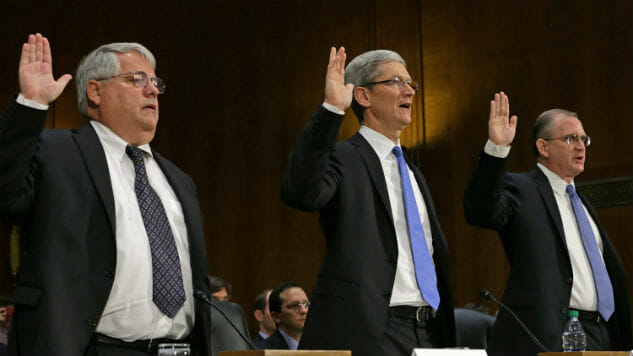On Apple and Ireland: Corporations Should Pay What They Owe, But Governments Must Make Them
Photos courtesy of Getty
It’s not often I’ll find myself agreeing with the Obama administration on matters of corporate responsibility. This is the same group of politicians currently pushing the Trans-Pacific Partnership and, more pertinently here in the UK, the Transatlantic Trade and Investment Partnership (TTIP). These are two proposed free trade agreements that, if implemented, will essentially see corporations supersede nation states in matters of law. We know this only because similar agreements already exist and, more importantly, because papers outlining super-secretive TTIP proposals have been leaked. It’s been said that TTIP would — among other things — allow corporations to sue governments for perceived loss of profits, in secret courts, presided over by judges who also happen to be corporate lawyers often employed by the companies themselves. (If you want a potential preview of things to come, check out El Salvador and Argentina, which have been sued by corporations for extortionate amounts simply for acting in accordance with their own laws.)
Nonetheless, today I find myself on the side of the people who think that kind of maniac neoliberalism is acceptable. On Wednesday last week, the US treasury threatened retaliation over a European commission tax avoidance investigation that could demand multiple American corporations pay billions in alleged unpaid tax. It’s come at a time of disorder and high public distrust in the establishment in Europe — in other words, a perfect time for the EU to take a symbolic swipe at the corporatocracy. The Obama administration, unsurprisingly, stood firmly behind big business, stating that EU investigations into firms including Starbucks, Amazon and more could set an “unfortunate precedent.” Tim Cook, whose Apple was this week ordered to pay up to $13 billion in additional corporation tax payments to Ireland, also chimed in, arguing “Apple pays every tax dollar we owe.”
-

-

-

-

-

-

-

-

-

-

-

-

-

-

-

-

-

-

-

-

-

-

-

-

-

-

-

-

-

-

-

-

-

-

-

-

-

-

-

-








































